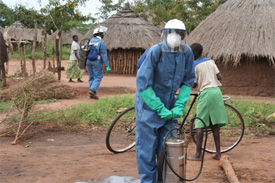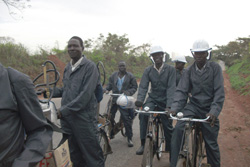The PMI-funded Uganda Indoor Residual Spraying project conducts IRS campaigns in six districts in Northern Uganda.
Malaria is the leading threat to the health of Uganda’s population and, according to the Ministry of Health, is responsible for approximately 40 percent of outpatient visits, 25 percent of inpatient visits, and nearly half of all deaths in children under five. Nearly 95 percent of Uganda’s population lives in high-transmission areas and is exposed to the disease throughout the year. Indoor residual spraying (IRS) is the targeted application of long-lasting insecticide to the inside walls and the ceiling of houses in a community to kill the mosquitoes that cause malaria. The PMI-funded Uganda Indoor Residual Spraying project conducts IRS campaigns in six districts in Northern Uganda.

Spray operators head out on their bicycles for a day of spraying. Most homes they spray are far off the main road. Source: Abt Associates Inc.

Wearing his personal protective equipment, a spray operator prepares his pump for spraying after riding to a village in Kitgum, Uganda. Source: Abt Associates Inc.

